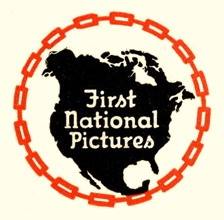Related Research Articles

First National Pictures was an American motion picture production and distribution company. It was founded in 1917 as First National Exhibitors' Circuit, Inc., an association of independent theatre owners in the United States, and became the country's largest theater chain. Expanding from exhibiting movies to distributing them, the company reincorporated in 1919 as Associated First National Theatres, Inc. and Associated First National Pictures, Inc.

Universal City Studios LLC, doing business as Universal Pictures, is an American film production and distribution company that is a division of Universal Studios, which is owned by NBCUniversal, a division of Comcast.
Orion Releasing, LLC is an American film production and distribution company owned by the Amazon MGM Studios subsidiary of Amazon.

Major film studios are production and distribution companies that release a substantial number of films annually and consistently command a significant share of box office revenue in a given market. In the American and international markets, the major film studios, often known simply as the majors or the Big Five studios, are commonly regarded as the five diversified media conglomerates whose various film production and distribution subsidiaries collectively command approximately 80 to 85% of U.S. box office revenue. The term may also be applied more specifically to the primary motion picture business subsidiary of each respective conglomerate.
Sony Pictures Classics Inc. is an American independent film production and distribution company that is a division of Sony Pictures. It was founded in 1992 by former Orion Classics heads Michael Barker, Tom Bernard and Marcie Bloom. It distributes, produces and acquires specialty films such as documentaries, independent and arthouse films in the United States and internationally. As of 2015, Barker and Bernard are co-presidents of the division, which is a member of the Motion Picture Association (MPA).

TriStar Pictures, Inc. is an American film studio and production company that is a member of the Sony Pictures Motion Picture Group, part of the multinational conglomerate Sony Group Corporation. It is a corporate sibling of fellow Sony studio, Columbia Pictures.
United States v. Paramount Pictures, Inc., 334 U.S. 131 (1948), was a landmark United States Supreme Court antitrust case that decided the fate of film studios owning their own theatres and holding exclusivity rights on which theatres would show their movies. It would also change the way Hollywood movies were produced, distributed, and exhibited. It also opened the door for more foreign and independent films to be shown in U.S. theaters. The Supreme Court affirmed the United States District Court for the Southern District of New York's ruling that the existing distribution scheme was in violation of United States antitrust law, which prohibits certain exclusive dealing arrangements.

Walt Disney Studios Motion Pictures is an American film distributor within the Disney Entertainment division of the Walt Disney Company. It handles theatrical and occasional digital distribution, marketing and promotion for films produced and released by the Walt Disney Studios, including Walt Disney Pictures, Walt Disney Animation Studios, Pixar, Marvel Studios, Lucasfilm, 20th Century Studios, and internationally Searchlight Pictures; which operates its own autonomous theatrical distribution and marketing unit in the United States.
A film distributor is a person responsible for the marketing of a film. The distribution company may be the same as, or different from, the production company. Distribution deals are an important part of financing a film.

The Independent Moving Pictures Company (IMP) was a motion picture studio and production company founded in 1909 by Carl Laemmle. The company was based in New York City, with production facilities in Fort Lee, New Jersey. In 1912, IMP merged with several other production companies to form Universal Film Manufacturing Company, later renamed Universal Pictures Company with Laemmle as president.

The Sony Pictures Motion Picture Group is a division of Sony Pictures Entertainment to manage its motion picture operations. It was launched in 1998 by integrating the businesses of Columbia Pictures Industries, Inc. and TriStar Pictures, Inc.

Trimark Pictures was an American production company that specialized in the production and distribution of television and home video motion pictures. The company was formed in 1984 by Mark Amin as Vidmark Entertainment with Vidmark Inc. established as the holding company. As a small studio, Trimark produced and released theatrical, independent, television and home video motion pictures. The logo features a triangle with a profile of a tiger's head.
Astor Pictures was a motion picture distribution company in the United States from 1930 to 1963. It was founded by Robert M. Savini. Astor specialized in film re-releases. It later released independently made productions, including some of its own films made during the 1950s.
Grand National Films, Inc was an American independent motion picture production-distribution company in operation from 1936 to 1939. The company had no relation to the British Grand National Pictures.
Alliance Films was Canada’s greatest motion picture and digital media producer and distributor that was founded in 1984 until its demise in 2013.

The General Film Company was a motion picture distribution company in the United States. Between 1909 and 1920, the company distributed almost 12,000 silent era motion pictures. It was created as part of the Edison Trust to monopolize film distribution.

A film studio is a major entertainment company that makes films. Today, they are mostly financing and distribution entities. Additionally, they may also have their own privately owned studio facility or facilities; however, most firms in the entertainment industry have never owned their own studios, but have rented space from other companies. The day-to-day filming operations are generally handled by their production company subsidiary.

Alcon Entertainment, LLC is an American indie film and television production company, founded in 1997 by film producers Andrew Kosove and Broderick Johnson. Since its establishment, Alcon Entertainment has developed and financed films that are ultimately distributed – in the United States mostly, and internationally on occasion – by Warner Bros. Pictures, following a ten-year motion picture production agreement.

Allied Artists International, Inc. (AAI) is an American multinational mass media and entertainment corporation headquartered in Glendale, California, United States, producing and distributing motion pictures, recorded music, broadcast television, online streaming, video games, and other media products. The company is the successor to Allied Artists Pictures Corporation. In the year 2000, AAI divided its media products into three distinct wholly owned divisions, Allied Artists Film Group (AAFG), Allied Artists Music Group (AAMG) and Allied Artists Music & Video Distribution (AAMVD). Then, around 2020, AAI reorganized itself into four divisions: Allied Artists Music Group, Allied Artists Film Group, Allied Artists Films & Monogram Pictures, & Allied Artists Broadcasting & Allied Artists Music & Video Distribution. Allied Artists Pictures is known for having produced and released such historic motion pictures as Cabaret, starring Joel Grey and Liza Minnelli; Papillon, starring Dustin Hoffman and Steve McQueen; and The Betsy, starring Laurence Olivier, Tommy Lee Jones, Robert Duvall, and Katharine Ross.

Allied Artists Music Group (AAMG) is the U.S. based multinational music focused entertainment and record label arm of Allied Artists International, Inc. (AAI), headquartered in Glendale, California. In 1971, AAI's predecessor Allied Artists Pictures Corporation officially formed subsidiary Allied Artists Records. By 1999, Allied Artists Records encompassed numerous imprint labels, including the flagship Allied Artists Records, Allied Artists Music Co., Monogram Records, Vista Records and Brimstone Records. The record label is known for having released such historic motion picture soundtracks as Elvis Presley's 1965 "Tickle Me" and Liza Minnelli's 1972 "Cabaret." On the traditional recorded music side, the company is recognized for its releases of Latin heavy metal band Renegade's entire catalog, including 1983's "Rock 'n' Roll Crazy!" and Luis Cardenas' 1986 "Animal Instinct," among many others. In the year 2000, with sales of physical records declining in lieu of digital downloads, Allied Artists Records consolidated all of its music related holdings into the newly branded "Allied Artists Music Group," becoming a formal division of its parent, AAI.
References
- ↑ The Motion Picture Distributing and Sales Company, Max Joseph Alvarez, Film History: An International Journal, Volume 19, Number 3, 2007, pp. 247-270, Indiana University Press.